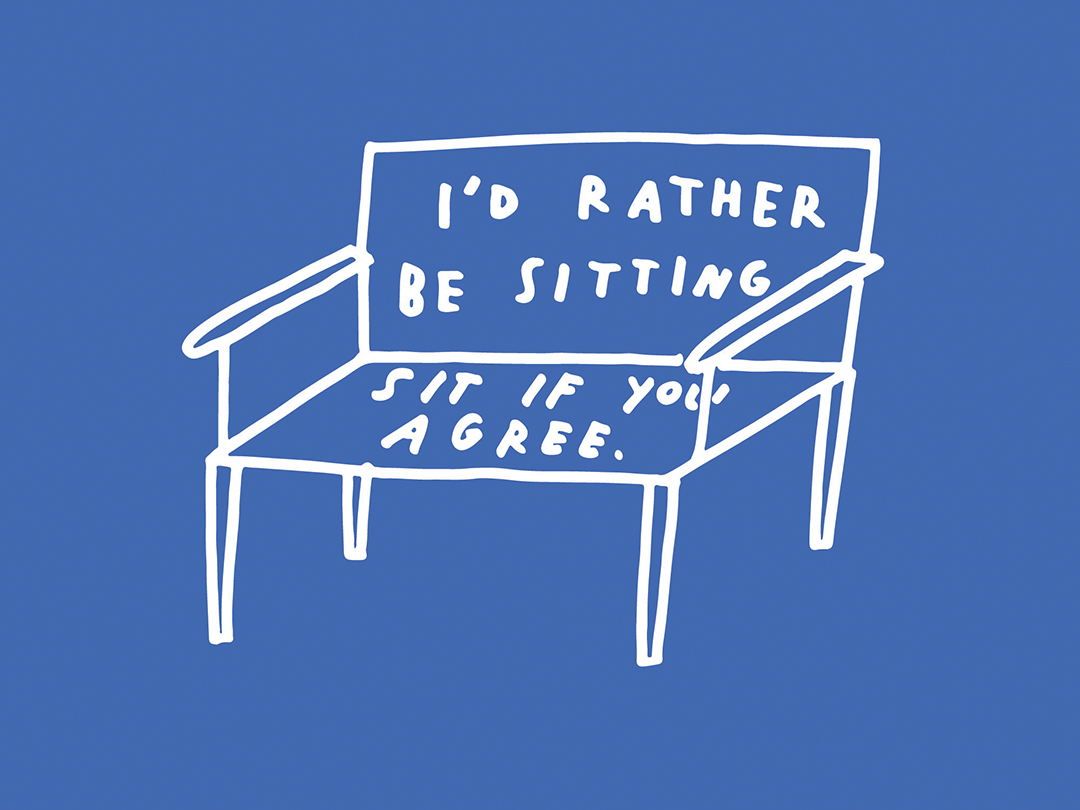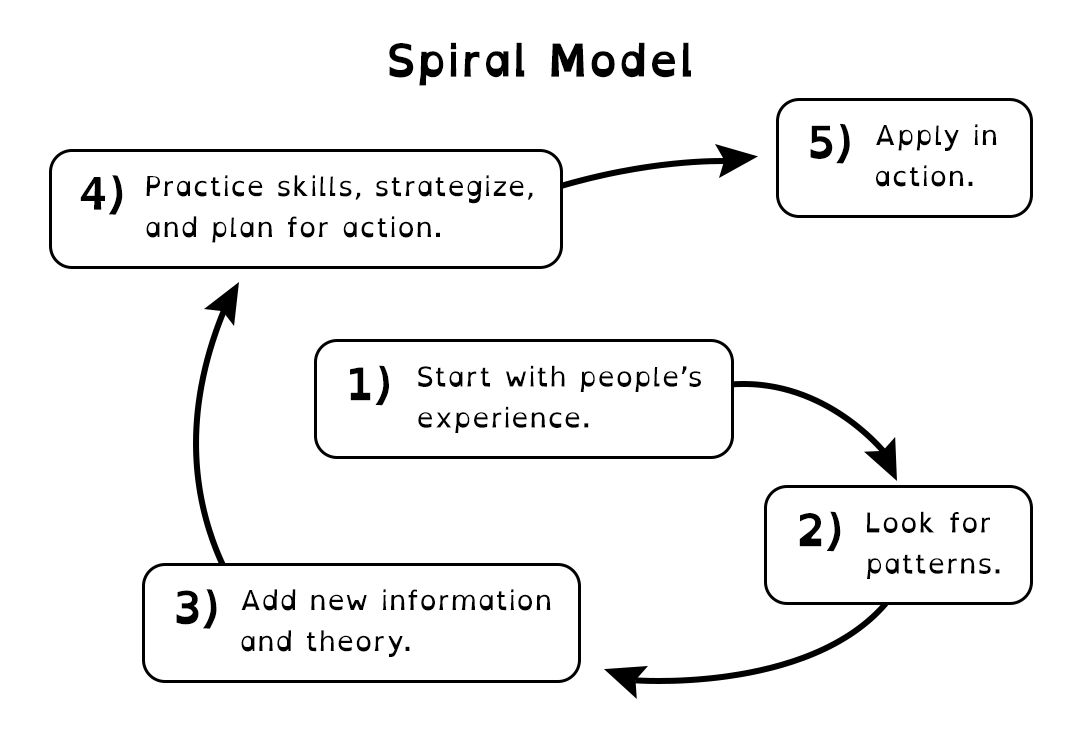About
PeoplesHub is an online popular education school for activists based in the U.S. We are led by and for disabled organizers and our allies, and offer public and private trainings, communities of practice, and peer support that are grounded in Solidarity Economy and Disability Justice principles. Skip to sections:

Artwork by Finnegan Shannon.
Our Approach
We are grounded in three lineages: Popular Education, Solidarity Economy, and Disability Justice.
Popular Education (Pop Ed) is a training methodology borne directly from liberation struggles. By using Pop Ed, we are acknowledging that education is political and the way we do it matters. Using this methodology, we not only educate, but also build collective power through practice. Pop Ed invites the wisdom within groups by drawing from our experiences to make sense of patterns, make connections to historic and present conditions, and make meaning of new information to always lead towards ACTION in the real world:

All of our trainers are people with experiences in community and in social movements that directly relate to the theory and practice shared in our offerings. We train up each other in skills for online facilitation and leadership development rooted in practices of disability justice and solidarity economy, and we work collectively as trainers to bring the very best of our shared knowledge to our offerings. We use the spiral above to support groups to integrate what they know into what we’re sharing, ultimately allowing all of us to co-create knowledge together across social movements and groups.
Disability Justice (DJ) is a framework arising from a principled intervention in the US disability rights movement by marginalized disabled people, particularly BIPOC, and queer/trans/non-binary disabled people. The US disability rights movement has been historically white-led and lacking in conviction or action at the intersections between race and disability. DJ was and is an attempt to illuminate a wider set of principles that are required for collective liberation. These include:
- Intersectionality
- Leadership of those most impacted
- Anti-capitalist politic
- Cross-movement solidarity
- Cross-movement organizing
- Recognizing wholeness
- Sustainability
- Interdependence
- Collective access
- Collective liberation
You can take a deeper dive into these principles and their history on the Sins Invalid website.
At PeoplesHub, we take these principles as just the first step in developing a liberatory politic as disabled people and allies. Our offerings push our communities to develop the practices and analysis that brings these principles into action. In doing so, we are honoring the work that came before while challenging our communities to do the work that future generations expect of us.

Solidarity Economy (SE) is a term to describe a framework and strategy for building ecologically sustainable, democratic, cooperative, mutually beneficial, and just economies. As the Solidarity Economy Principles project puts it:
Solidarity economies are transformative — they redistribute power and resources to those who have been most harmed by white supremacy, settler colonialism, patriarchy, ableism, and capitalism — and meet an immediate material need for a community. They are not symbolic, but actually delivering the housing, food, education, culture, and other needs humans require to thrive. They challenge the power of systems based on individualism, profit, and private property. Solidarity economies emerge from movements and integrate the three common strategies for social change: personal transformation, building alternative institutions, and challenging dominant institutions. Building solidarity economy movements requires building networks, federations, and coalitions that align with SE principles and practices. This is where we become truly powerful.
PeoplesHub takes inspiration from the principles and practices documented by the Solidarity Economy Principles project, and seeks to internally and externally uphold these methods. That includes working collectively and cooperatively as a staff and with those we partner with — this includes using sliding scales, sharing resources with other organizations, joining campaigns and coalitions, and offering accessible gathering spaces for those engaged in SE work to deepen their work and relationships, just to name a few.
Just as with the DJ principles, we take the principles and practices of Solidarity Economy Principles project as a beginning, and understand part of our responsibility is to engage respectfully with the many movement lineages that converge in SE organizing while also pushing our communities to move ever deeper into the unlearning required to become truly cooperative and interdependent.
Our Story

PeoplesHub organizers at a retreat, circa 2017.
Brief History
PeoplesHub began as a project to connect rural, tribal, and under-resourced urban communities with trainers skilled in making social change. The idea was inspired by Yes! Magazine co-founder Sarah van Gelder's 12,000-mile journey, where she met local activists who voiced a common need: access to the same caliber of training opportunities available to larger, urban non-profits. Instead of expecting people doing great work in their communities to leave their communities — at costs they typically could not afford — what would it look like to bring training to them, online?
During this period of intense growth meeting the new online normal, we suddenly lost our visionary leader, Elandria Williams, who was bringing us all together. We entered a period of grief and turmoil as an organization, even as we built new disability justice and solidarity economy programs and grew our community.
From 2016 through 2019, PeoplesHub developed this concept, created curriculum, and equipped its trainers with the technical skills needed for online facilitation, all the while grounded in Popular Education methods drawn from Highlander Center and Training for Change.
In early 2020 everything changed. With the onset of the COVID-19 pandemic, suddenly all of the US social movement was online, regardless of geography and level of resources. At the same time, disabled and chronically ill people were pushing to get access to social movements, and more and more people were becoming ill and disabled because of the multiple public health crises that define our current era. As an access-centered organization with chronically ill and disabled folks in leadership from the start, PeoplesHub was well positioned to help meet this expanding need.
In 2023, we shifted our programs and organization to more clearly focus on disability justice and solidarity economy principles. We committed to rigorously training up disabled organizers in the facilitation and collective leadership skills needed to transform disabling conditions that define our lives.
Today we carry with us PeoplesHub's original commitment to Popular Education and online training with a new generation of disabled trainers and facilitators.
Staff Collective
PeoplesHub is administered by a staff collective as a worker self-directed nonprofit. We welcome opportunities to learn from and with other organizations who are engaging in collective leadership. If your group wants to be in touch about how we work, email info (at) peopleshub (dot) org.
